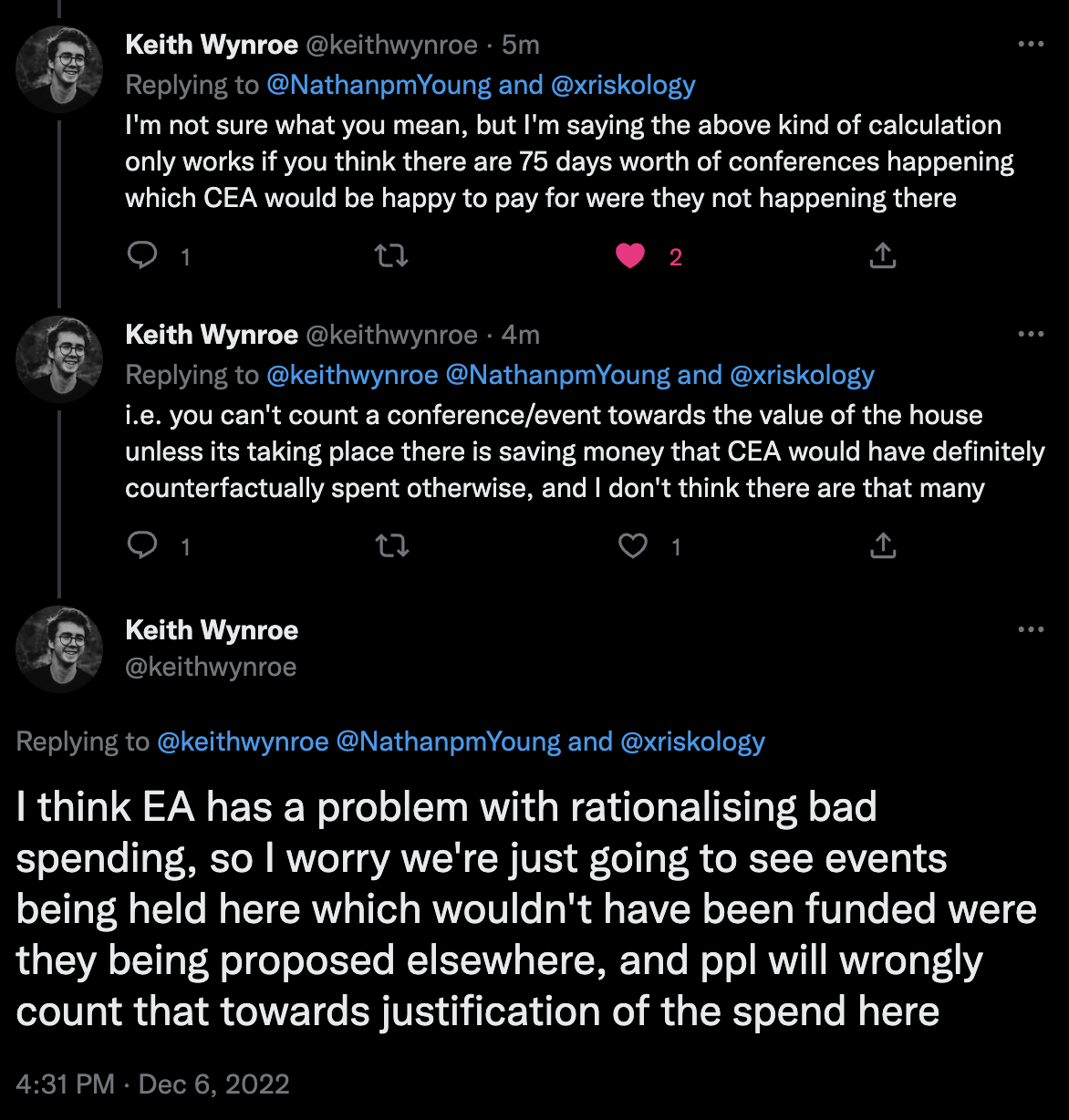Edit to add (9/1/2023): This post was written quickly and I judged things prematurely. I also regret not reaching out to Effective Ventures before posting it. Regarding my current opinion on the Abbey: I don't have anything really useful to say that isn't mentioned by others. The goal of this post was to ask a question and gather information, mostly because I was very surprised. I don't have a strong opinion on the purchase anymore and the ones I have are with high uncertainty. More thoughts in my case for transparent spending.
Yesterday morning I woke up and saw this tweet by Émile Torres: https://twitter.com/xriskology/status/1599511179738505216
I was shocked, angry and upset at first. Especially since it appears that the estate was for sale last year for 15 million pounds: https://twitter.com/RhiannonDauster/status/1599539148565934086
I'm not a big fan of Émile's writing and how they often misrepresent the EA movement. But that's not what this question is about, because they do raise a good point here: Why did CEA buy this property? My trust in CEA has been a bit shaky lately, and this doesn't help.
Apparently it was already mentioned in the New Yorker piece: https://www.newyorker.com/magazine/2022/08/15/the-reluctant-prophet-of-effective-altruism#:~:text=Last year%2C the Centre for Effective Altruism bought Wytham Abbey%2C a palatial estate near Oxford%2C built in 1480. Money%2C which no longer seemed an object%2C was increasingly being reinvested in the community itself.
"Last year, the Centre for Effective Altruism bought Wytham Abbey, a palatial estate near Oxford, built in 1480. Money, which no longer seemed an object, was increasingly being reinvested in the community itself."
For some reason I glanced over it at the time, or I just didn't realize the seriousness of it.
Upon more research, I came across this comment by Shakeel Hashim: "In April, Effective Ventures purchased Wytham Abbey and some land around it (but <1% of the 2,500 acre estate you're suggesting). Wytham is in the process of being established as a convening centre to run workshops and meetings that bring together people to think seriously about how to address important problems in the world. The vision is modelled on traditional specialist conference centres, e.g. Oberwolfach, The Rockefeller Foundation Bellagio Center or the Brocher Foundation.
The purchase was made from a large grant made specifically for this. There was no money from FTX or affiliated individuals or organizations." https://forum.effectivealtruism.org/posts/Et7oPMu6czhEd8ExW/why-you-re-not-hearing-as-much-from-ea-orgs-as-you-d-like?commentId=uRDZKw24mYe2NP4eq
I'm very relieved to hear money from individual donors wasn't used. And the <1% suggests 15 million pounds perhaps wasn't spent. Still, I'd love to hear and understand more about this project and why CEA thinks it's cost-effective. What is the EV calculation behind it?
Like the New Yorker piece points out, with more funding there has been a lot of spending within the movement itself. And that's fine, great even. This way more outreach can be done and the movement can grow. But we don't want to be too self-serving, and I'm scared too much of this thinking will lead to rationalizing lavish expenses (and I'm afraid this is already happening). There needs to be more transparency behind big expenses.
Edit to add: If this expense has been made a while back, why not announce it then?


Justify to who? I would like to have an EA that has some individual initiative, where people can make decisions using their resources to try to seek good outcomes. I agree that when actions have negative externalities, external checks would help. But it's not obvious to me that those external checks weren't passed in this case*, and if you want to propose a specific standard we should try to figure out whether or not that standard would actually help with optics.
Like, if the purchase of Wytham Abbey had been posted on the EA forum, and some people had said it was a good idea and some people said it was a bad idea, and then the funders went ahead and bought it, would our optics situation look any different now? Is the idea that if anyone posted that it was a bad idea, they shouldn't have bought it?
[And we need to then investigate whether or not adding this friction to the process ends up harming it on net; property sales are different in lots of places, but there are some where adding a week to the "should we do this?" decision-making process means implicitly choosing not to buy any reasonably-priced property, since inventory moves too quickly, and only overpriced property stays on the market for more than a week.]
* I don't remember being consulted about Wytham, but I'm friends with the people running it and broadly trust their judgment, and guess that they checked with people as to whether or not they thought it was a good idea. I wasn't consulted about the specific place Irena ended up buying, but I was consulted somewhat on whether or not Irena should buy a venue, and I thought she should, going so far as being willing to support it with some of my charitable giving, which ended up not being necessary.